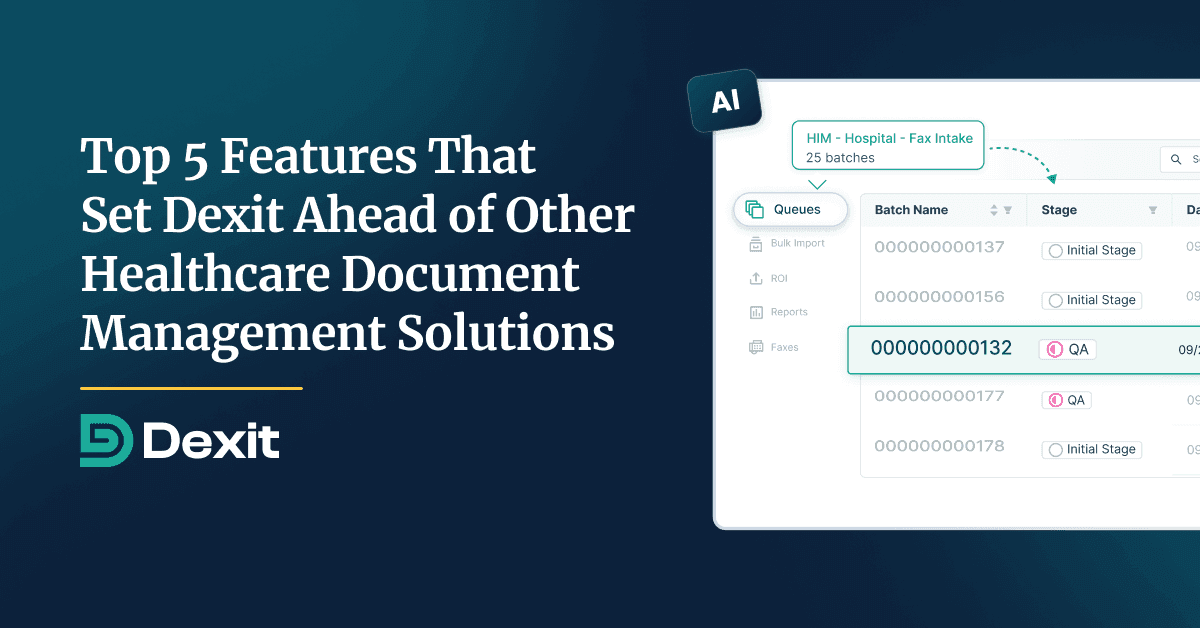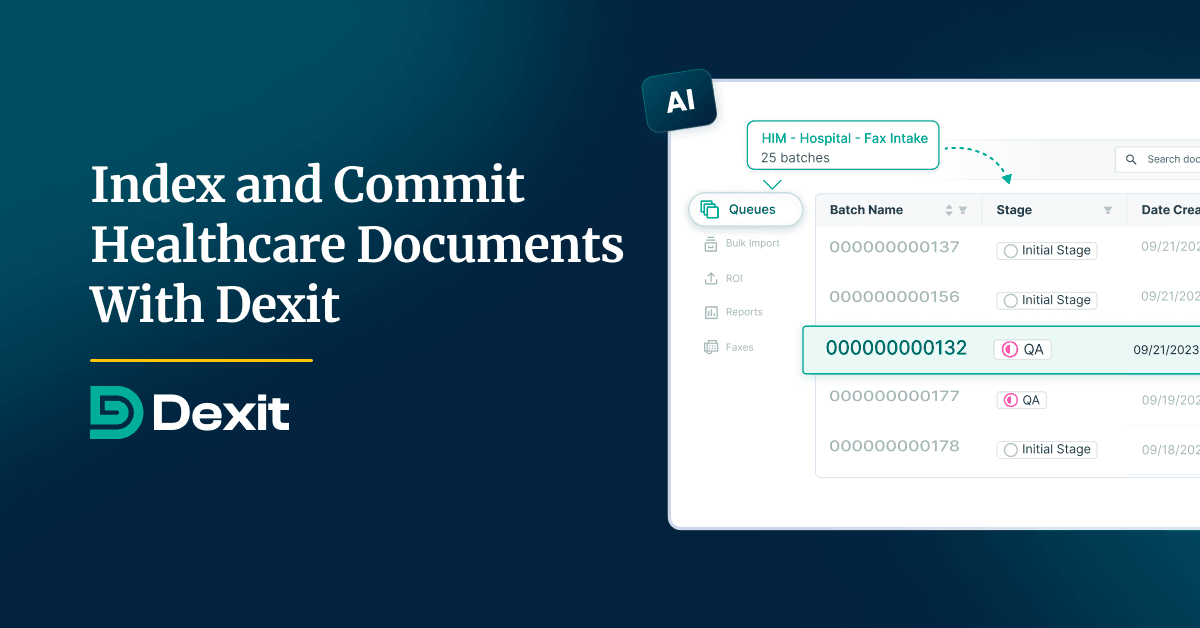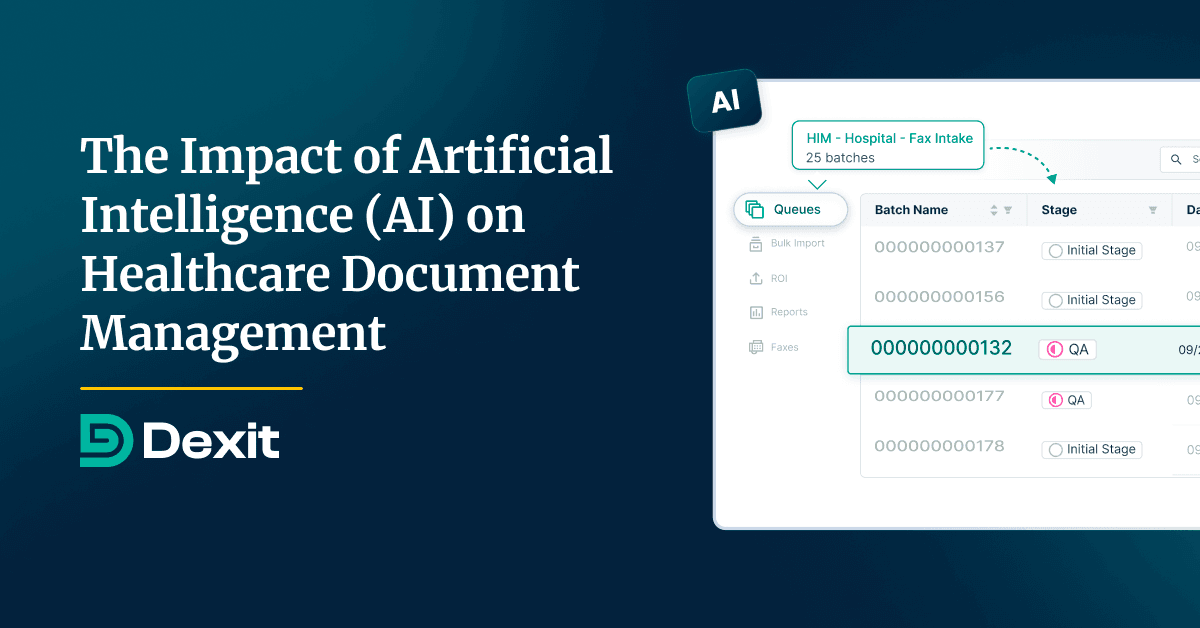
Top 5 Features That Set Dexit Ahead of Other Healthcare Document Management Solutions
With the advent of advanced healthcare document management technologies, Health Information Management (HIM) …

In the rapidly evolving healthcare landscape, where patient outcomes and personalized care are paramount, the significance of effective healthcare document management cannot be overstated. For Health Information Management (HIM) leaders, the quest to elevate patient-centric care is often hobbled by outdated systems and scattered data.
Today’s blog delves deep into the various ways to improve healthcare document management while placing patient care at its core. We will explore how leveraging modern, AI-powered Document Management Systems (DMS) streamlines processes and fundamentally transforms them to foster greater patient engagement.
Explore:
In the contemporary healthcare landscape, embracing a patient-centric approach in healthcare document management emerges as a linchpin for delivering superior health services. This strategy pivots on the idea that patients' needs and perspectives should guide the organization, accessibility, and security of medical documents.
By prioritizing a system that is both intuitive and sensitive to patient needs, healthcare providers can ensure that personal health information is managed in a way that enhances care delivery.
Such an approach not only streamlines the workflow for healthcare professionals but also empowers patients by facilitating better access to their own medical records, leading to increased engagement, improved treatment outcomes, and heightened trust in healthcare systems.
Implementing patient-centered document management systems goes beyond efficiency — it symbolizes a commitment to dignified care where the patient's well-being is the heart of all operations.
Read blog: The Vital Role of a Patient-Centric Approach in Healthcare Document Management
Effective healthcare document management is critical to providing high-quality patient care. By adopting a multipronged approach, healthcare facilities can streamline patient data processing and improve service delivery.
Some of the strategies for improving healthcare document management to enhance patient care are:
These strategies address key aspects of healthcare document management, including digitalization, efficiency, standardization, compliance, and staff education, all of which contribute to enhancing patient care.
Read blog: Streamlining Healthcare Documentation: Strategies for Enhanced Patient Care
An AI-powered Document Management System has the potential to revolutionize healthcare document management by making information more accessible, accurate, and actionable, ultimately enhancing patient-centric care across the healthcare continuum.
The various ways AI can enhance healthcare document management include
Read blog: The Impact of Artificial Intelligence (AI) on Healthcare Document Management
Cloud faxing stands as a transformative tool in modernizing patient care document processes, effectively bridging the gap between traditional communications and digital efficiencies. By integrating secure cloud-based technology, healthcare providers can send and receive patient information with heightened speed, enhancing the timely coordination of care.
In an industry where seconds can be vital, the near-instantaneous transmission of medical records, lab results, and prescriptions ensures critical information is in the right hands when needed.
Cloud faxing also significantly minimizes the risks associated with paper faxes, such as lost documents or breaches of patient confidentiality. Furthermore, it aligns with HIPAA compliance, providing encryption and secure access controls that safeguard patient privacy. The result is a streamlined workflow that not only boosts productivity but also upholds the integrity of patient data, leading to improved health outcomes and patient satisfaction.
Read blog: How Cloud Faxing Transforms Patient Care Document Processes
In conclusion, the evolution of healthcare document management is intricately linked with the pursuit of patient-centric care. The various strategies discussed in this blog underscore a fundamental shift towards prioritizing patients' needs and well-being.
By placing patients at the heart of document management practices, healthcare providers can not only streamline processes and improve efficiency but also empower individuals to participate actively in their own care journey. This patient-centric approach fosters greater engagement, trust, and, ultimately, better health outcomes.
As we navigate the ever-changing landscape of healthcare, it's imperative that we continue to innovate and prioritize solutions that enhance patient care at every touchpoint. By leveraging modern technologies and embracing a holistic approach to document management, we can truly revolutionize how healthcare is delivered, ensuring that patients remain at the forefront of our efforts.
Join over 3,200 subscribers and keep up-to-date with the latest innovations & best practices in Healthcare IT.

With the advent of advanced healthcare document management technologies, Health Information Management (HIM) …

Within the realm of healthcare document indexing, precision is paramount. It guarantees that every piece of …

The advent of Artificial Intelligence (AI) has signaled a revolutionary shift across various sectors, with the …